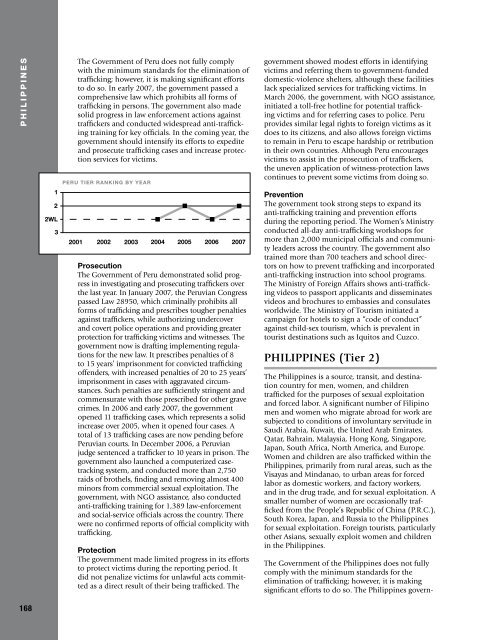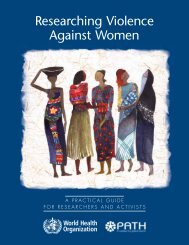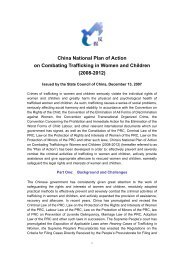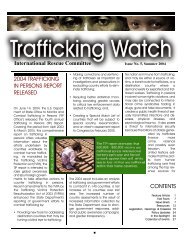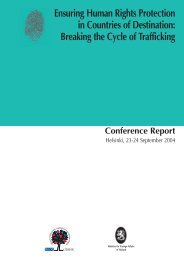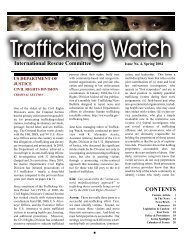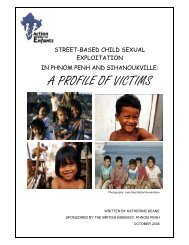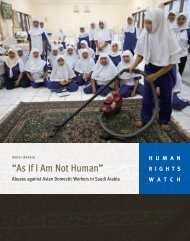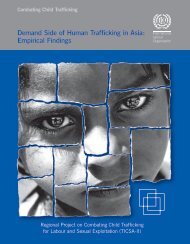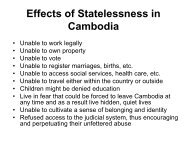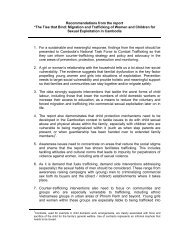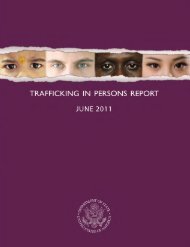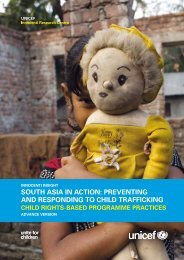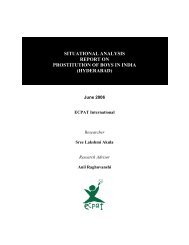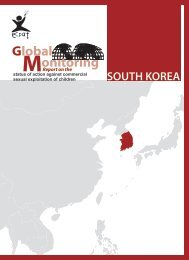2007 Trafficking in Persons Report - Center for Women Policy Studies
2007 Trafficking in Persons Report - Center for Women Policy Studies
2007 Trafficking in Persons Report - Center for Women Policy Studies
Create successful ePaper yourself
Turn your PDF publications into a flip-book with our unique Google optimized e-Paper software.
P H I L I P P I N E S<br />
168<br />
The Government of Peru does not fully comply<br />
with the m<strong>in</strong>imum standards <strong>for</strong> the elim<strong>in</strong>ation of<br />
traffick<strong>in</strong>g; however, it is mak<strong>in</strong>g significant ef<strong>for</strong>ts<br />
to do so. In early <strong>2007</strong>, the government passed a<br />
comprehensive law which prohibits all <strong>for</strong>ms of<br />
traffick<strong>in</strong>g <strong>in</strong> persons. The government also made<br />
solid progress <strong>in</strong> law en<strong>for</strong>cement actions aga<strong>in</strong>st<br />
traffickers and conducted widespread anti-traffick<strong>in</strong>g<br />
tra<strong>in</strong><strong>in</strong>g <strong>for</strong> key officials. In the com<strong>in</strong>g year, the<br />
government should <strong>in</strong>tensify its ef<strong>for</strong>ts to expedite<br />
and prosecute traffick<strong>in</strong>g cases and <strong>in</strong>crease protection<br />
services <strong>for</strong> victims.<br />
Prosecution<br />
The Government of Peru demonstrated solid progress<br />
<strong>in</strong> <strong>in</strong>vestigat<strong>in</strong>g and prosecut<strong>in</strong>g traffickers over<br />
the last year. In January <strong>2007</strong>, the Peruvian Congress<br />
passed Law 28950, which crim<strong>in</strong>ally prohibits all<br />
<strong>for</strong>ms of traffick<strong>in</strong>g and prescribes tougher penalties<br />
aga<strong>in</strong>st traffickers, while authoriz<strong>in</strong>g undercover<br />
and covert police operations and provid<strong>in</strong>g greater<br />
protection <strong>for</strong> traffick<strong>in</strong>g victims and witnesses. The<br />
government now is draft<strong>in</strong>g implement<strong>in</strong>g regulations<br />
<strong>for</strong> the new law. It prescribes penalties of 8<br />
to 15 years’ imprisonment <strong>for</strong> convicted traffick<strong>in</strong>g<br />
offenders, with <strong>in</strong>creased penalties of 20 to 25 years’<br />
imprisonment <strong>in</strong> cases with aggravated circumstances.<br />
Such penalties are sufficiently str<strong>in</strong>gent and<br />
commensurate with those prescribed <strong>for</strong> other grave<br />
crimes. In 2006 and early <strong>2007</strong>, the government<br />
opened 11 traffick<strong>in</strong>g cases, which represents a solid<br />
<strong>in</strong>crease over 2005, when it opened four cases. A<br />
total of 13 traffick<strong>in</strong>g cases are now pend<strong>in</strong>g be<strong>for</strong>e<br />
Peruvian courts. In December 2006, a Peruvian<br />
judge sentenced a trafficker to 10 years <strong>in</strong> prison. The<br />
government also launched a computerized casetrack<strong>in</strong>g<br />
system, and conducted more than 2,750<br />
raids of brothels, f<strong>in</strong>d<strong>in</strong>g and remov<strong>in</strong>g almost 400<br />
m<strong>in</strong>ors from commercial sexual exploitation. The<br />
government, with NGO assistance, also conducted<br />
anti-traffick<strong>in</strong>g tra<strong>in</strong><strong>in</strong>g <strong>for</strong> 1,389 law-en<strong>for</strong>cement<br />
and social-service officials across the country. There<br />
were no confirmed reports of official complicity with<br />
traffick<strong>in</strong>g.<br />
Protection<br />
The government made limited progress <strong>in</strong> its ef<strong>for</strong>ts<br />
to protect victims dur<strong>in</strong>g the report<strong>in</strong>g period. It<br />
did not penalize victims <strong>for</strong> unlawful acts committed<br />
as a direct result of their be<strong>in</strong>g trafficked. The<br />
government showed modest ef<strong>for</strong>ts <strong>in</strong> identify<strong>in</strong>g<br />
victims and referr<strong>in</strong>g them to government-funded<br />
domestic-violence shelters, although these facilities<br />
lack specialized services <strong>for</strong> traffick<strong>in</strong>g victims. In<br />
March 2006, the government, with NGO assistance,<br />
<strong>in</strong>itiated a toll-free hotl<strong>in</strong>e <strong>for</strong> potential traffick<strong>in</strong>g<br />
victims and <strong>for</strong> referr<strong>in</strong>g cases to police. Peru<br />
provides similar legal rights to <strong>for</strong>eign victims as it<br />
does to its citizens, and also allows <strong>for</strong>eign victims<br />
to rema<strong>in</strong> <strong>in</strong> Peru to escape hardship or retribution<br />
<strong>in</strong> their own countries. Although Peru encourages<br />
victims to assist <strong>in</strong> the prosecution of traffickers,<br />
the uneven application of witness-protection laws<br />
cont<strong>in</strong>ues to prevent some victims from do<strong>in</strong>g so.<br />
Prevention<br />
The government took strong steps to expand its<br />
anti-traffick<strong>in</strong>g tra<strong>in</strong><strong>in</strong>g and prevention ef<strong>for</strong>ts<br />
dur<strong>in</strong>g the report<strong>in</strong>g period. The <strong>Women</strong>’s M<strong>in</strong>istry<br />
conducted all-day anti-traffick<strong>in</strong>g workshops <strong>for</strong><br />
more than 2,000 municipal officials and community<br />
leaders across the country. The government also<br />
tra<strong>in</strong>ed more than 700 teachers and school directors<br />
on how to prevent traffick<strong>in</strong>g and <strong>in</strong>corporated<br />
anti-traffick<strong>in</strong>g <strong>in</strong>struction <strong>in</strong>to school programs.<br />
The M<strong>in</strong>istry of Foreign Affairs shows anti-traffick<strong>in</strong>g<br />
videos to passport applicants and dissem<strong>in</strong>ates<br />
videos and brochures to embassies and consulates<br />
worldwide. The M<strong>in</strong>istry of Tourism <strong>in</strong>itiated a<br />
campaign <strong>for</strong> hotels to sign a “code of conduct”<br />
aga<strong>in</strong>st child-sex tourism, which is prevalent <strong>in</strong><br />
tourist dest<strong>in</strong>ations such as Iquitos and Cuzco.<br />
PHILIPPINES (Tier 2)<br />
The Philipp<strong>in</strong>es is a source, transit, and dest<strong>in</strong>ation<br />
country <strong>for</strong> men, women, and children<br />
trafficked <strong>for</strong> the purposes of sexual exploitation<br />
and <strong>for</strong>ced labor. A significant number of Filip<strong>in</strong>o<br />
men and women who migrate abroad <strong>for</strong> work are<br />
subjected to conditions of <strong>in</strong>voluntary servitude <strong>in</strong><br />
Saudi Arabia, Kuwait, the United Arab Emirates,<br />
Qatar, Bahra<strong>in</strong>, Malaysia, Hong Kong, S<strong>in</strong>gapore,<br />
Japan, South Africa, North America, and Europe.<br />
<strong>Women</strong> and children are also trafficked with<strong>in</strong> the<br />
Philipp<strong>in</strong>es, primarily from rural areas, such as the<br />
Visayas and M<strong>in</strong>danao, to urban areas <strong>for</strong> <strong>for</strong>ced<br />
labor as domestic workers, and factory workers,<br />
and <strong>in</strong> the drug trade, and <strong>for</strong> sexual exploitation. A<br />
smaller number of women are occasionally trafficked<br />
from the People’s Republic of Ch<strong>in</strong>a (P.R.C.),<br />
South Korea, Japan, and Russia to the Philipp<strong>in</strong>es<br />
<strong>for</strong> sexual exploitation. Foreign tourists, particularly<br />
other Asians, sexually exploit women and children<br />
<strong>in</strong> the Philipp<strong>in</strong>es.<br />
The Government of the Philipp<strong>in</strong>es does not fully<br />
comply with the m<strong>in</strong>imum standards <strong>for</strong> the<br />
elim<strong>in</strong>ation of traffick<strong>in</strong>g; however, it is mak<strong>in</strong>g<br />
significant ef<strong>for</strong>ts to do so. The Philipp<strong>in</strong>es govern-


